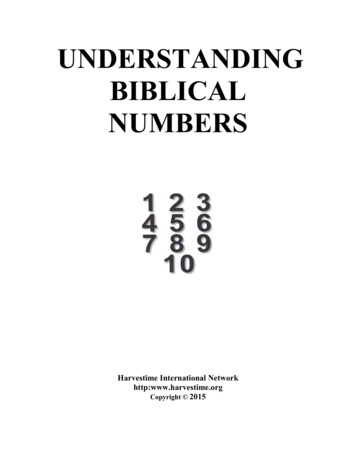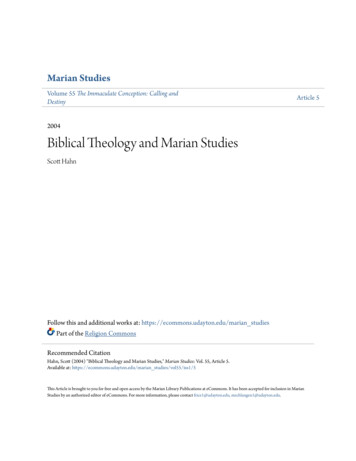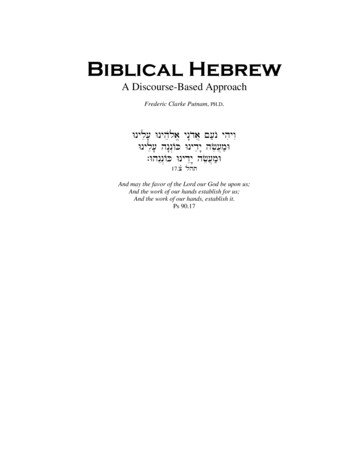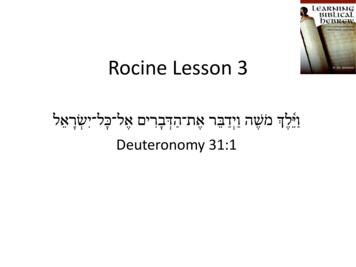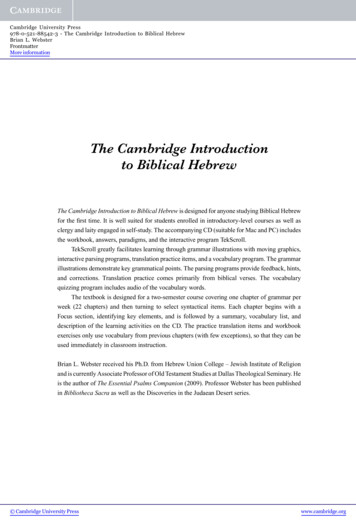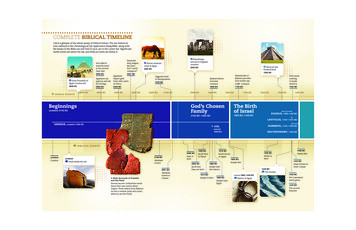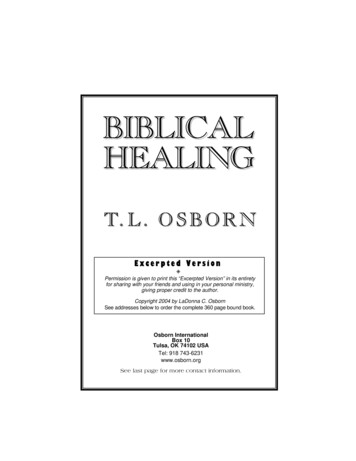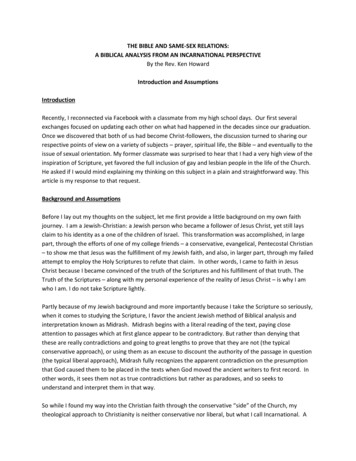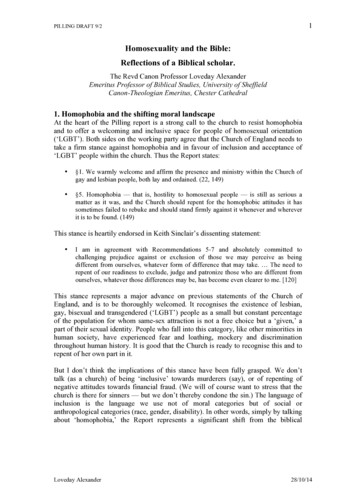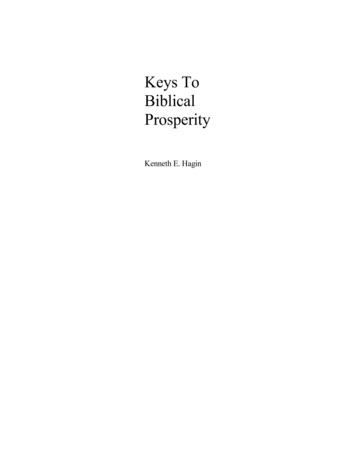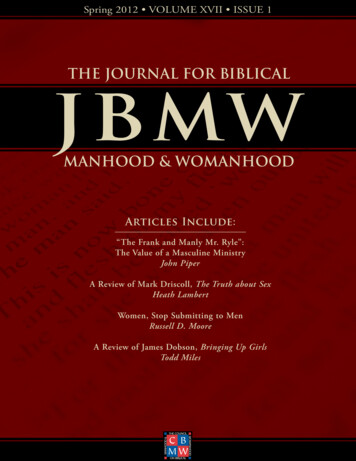
Transcription
Spring 2012 VOLUME XVII ISSUE 1THE JOURNAL FOR BIBLICALJBMWMANHOOD & WOMANHOODArticles Include:“The Frank and Manly Mr. Ryle”:The Value of a Masculine MinistryJohn PiperA Review of Mark Driscoll, The Truth about SexHeath LambertWomen, Stop Submitting to MenRussell D. MooreA Review of James Dobson, Bringing Up GirlsTodd Miles
THE JOURNAL FORBIBLICAL MANHOODAND WOMANHOODis a biannual publication of theCouncil on BiblicalManhood and WomanhoodISSN: 1544-5143CBMWPresidentJ. Ligon Duncan, IIISenior FellowRandy StinsonJBMW STAFFEditorDenny BurkAssociate EditorChristopher W. CowanAssistant EditorDawn JonesSenior Consulting EditorsJ. Ligon Duncan, IIIWayne GrudemRebecca JonesPeter R. Schemm Jr.Bruce A. WarePeer Review BoardEverett BerryJason DeRouchieJim HamiltonBarry JoslinHeath LambertRob ListerJason MeyerScott SwainLayout and DesignBarbara RogersTable of ContentsStandard Fare2Editorial5Odds & EndsEssays & Perspectives8Women, Stop Submitting to MenRussell D. Moore10“The Frank and Manly Mr. Ryle”:The Value of a Masculine MinistryJohn Piper23Of “Dad Moms” and “Man Fails”:An Essay on Men and AwesomenessOwen Strachan27From the NRSV to the New NIV: Why Gender-NeutralLanguage Represents an Enforced Agenda Rather than aNatural EvolutionLouis MarkosFrom the Sacred Desk31How Do We Speak About Homosexuality?Denny BurkGender Studies in Review38The Ironies of Real MarriageA Review of Mark Driscoll, The Truth about SexHeath LambertEditorial Correspondencejournaleditor@cbmw.org45The End of Sexual Identity or Sexual Morality?A Review of Jenell Williams Paris, The End of Sexual IdentityKenneth MagnusonContact CBMW for institutional rates.2825 Lexington Road Box 926Louisville, Kentucky 40280502.897.4065 (voice)502.897.4061 (fax)office@cbmw.org (e-mail)www.cbmw.org (web)49Cultivating Womanhood in a World of Competing VoicesA Review of James Dobson, Bringing Up GirlsTodd L. Miles52Give Them Jesus: Parenting with the GospelA Review of Elyse Fitzpatrick and Jessica Thompson,Give Them GraceAndrew David Naselli and Jennifer J. Naselli57A Valuable Historical StudyA Review of Diana Lynn Severance, Feminine ThreadsCourtney ReissigContributorsR. Albert Mohler Jr.Russell D. MooreNancy Leigh DeMossSubscription Correspondencejournal@cbmw.org 2012 CBMW. The mission of theCouncil on Biblical Manhood andWomanhood is to set forth the teachingsof the Bible about the complementarydifferences between men and women,created equal in the image of God,because these teachings are essential forobedience to Scripture and for the healthof the family and the Church.CBMW is a member of the EvangelicalCouncil for Financial Accountability.JBMW Spring 2012 1
Standard FareEditorial:Junia Is a Woman,and I Am a ComplementarianDenny BurkEditor, Journal for Biblical Manhood & WomanhoodAssociate Professor of Biblical StudiesThe Southern Baptist Theological SeminaryLouisville, KentuckyScot McKnight is one of my favorite egalitarians. We are quite different in our theologicalperspectives, but he is an all around engaging personality. He is a fantastic New Testament scholarand a prolific writer. His interests are wide-ranging,and he is gifted both at producing serious scholarship and at reaching more popular audiences withhis work. In my view, he’s a triple threat: seriousscholar, popular blogger, and charismatic speaker.He has a gift for communicating serious ideas towide audiences.His new little e-book Junia Is Not Alone(Patheos Press, 2011) is no exception. In this littlepamphlet, McKnight argues at the popular level infavor of an egalitarian reading of Scripture (thoughhe prefers to call his view “mutuality”). Taking Juniaas his point of departure (Rom 16:7), he argues thatwomen have been routinely overlooked in the lifeand ministry of the Christian church. Thus, Junia isnot alone in being slighted by a patriarchal vision ofgender roles in the church and the home.COUNCIL MEMBERSDaniel L. AkinDonald BalasaJames BorlandAustin ChapmanJack CottrellJ. Ligon Duncan IIISteve FarrarMary FarrarWayne A. GrudemJoshua HarrisDaniel HeimbachH. Wayne HouseSusan HuntElliott JohnsonPeter JonesRebecca JonesMary KassianGeorge W. Knight IIIC. J. MahaneyR. Albert Mohler Jr.Heather Moore2 JBMW Spring 2012Dorothy PattersonJohn PiperJames StahrK. Erik ThoennesBruce A. WareBOARD OF REFERENCES. M. BaughWallace BennTal BrookeThough he makes mention of a litany offemale Bible characters, McKnight gives most ofhis attention to explaining how and why Junia’slegacy has been suppressed. On this point, his argument is not new. He makes the case that—notwithstanding those who have manipulated the Greekaccents to transform her into a man (“Junias”)—the name Iounias should be understood as feminine(“Junia”). Thus, Junia is a woman who Paul namesas an apostle, and as such she was a “Christ-experiencing, Christ-representing, church-establishing,probably miracle-working, missionizing womanwho preached the gospel and taught the church.”McKnight says that he bases his view of Junia’sgender almost entirely on Eldon Epp’s book Junia:The First Woman Apostle, and McKnight agrees withEpp’s conclusions that:Nancy Leigh DeMossLane T. DennisThomas R. EdgarJohn FramePaul GardnerW. Robert GodfreyBill H. HaynesDavid M. Howard Sr.R. Kent HughesJames B. HurleyPaul Karleen(1) Junia was a woman.(2) There is no evidence that any manhad the name “Junias.”(3) Junia is not, as some have argued, aCharles S. & Rhonda H. KelleyBeverly LaHayeGordon R. LewisRobert LewisCrawford & Karen LorittsErwin LutzerJohn F. MacArthur Jr.Connie MarshnerRichard L. MayhueMarty MintonJ. P. MorelandJ. Stanley OakesRaymond C. Ortlund Jr.J. I. PackerPaige PattersonDennis & Barbara RaineyRobert SaucyJames SauerSiegfried SchatzmannThomas R. SchreinerF. LaGard SmithR. C. SproulJoseph M. Stowell IIILarry WalkerStu WeberWilliam WeinrichLuder WhitlockPeter Williamson
contracted name of Junianus.(4) “Among the apostles” means Juniaherself was an apostle and not simplythat the apostles thought she was a goodegg.According to McKnight, a female apostlewould have been totally uncontroversial in theegalitarian communities with whom Paul corresponded. It is only subsequent generations of patriarchy that have silenced her and have given her a“sex change” by transforming her name into a masculine one.At the heart of McKnight’s argument, however, is a critical weakness. Merely demonstratingthat Junia was a woman (as all the early commentators do) does little by itself to advance an egalitarian point of view. The bottom line issue is notwhether Junia was a woman. Complementarianslike myself agree with the fact that Junia was awoman. The bottom line issue is Junia’s relationship to the apostles.Though McKnight dismisses this as a possibility, there are serious and weighty arguments infavor of the translation that Junia was not one ofthe apostles but that she was “well known to theapostles” (ESV, NET). In 2001, for example, Daniel Wallace and Mike Burer defended the translation “well known to the apostles,” and the resultsof their research were published in New TestamentStudies.1 McKnight relies on Epp’s response to theWallace/Burer proposal, but Burer has recentlyresponded to Epp’s book and has shown the continuing strength of his and Wallace’s original thesisthat Junia was “well known to the apostles.”2 Wallace and Burer’s argument cannot be easily brushedaside.But even if one disagrees with Wallace andBurer, that still doesn’t settle the issue in favor ofrecognizing Junia as an apostle. McKnight givesvery little space to the possibility that the Greekterm apostolos may be used in a non-technical sensein Rom 16:7. The word apostolos is not used in theNew Testament uniformly to denote the office ofauthority that was held by the twelve. In Phil 2:25,for instance, Epaphroditus was an apostolos sentby the Philippians to minister to Paul’s need. Nointerpreter believes Epaphroditus to be an apostle.Rather, it is clear that Epaproditus was an apostolosin the sense of a “messenger” or an “envoy” who doesnot have any extraordinary status (cf. John 13:16; 2Cor 8:23). Given Paul’s well-known prohibition ofwomen in authority (1 Tim 2:12), it is most likelythat Junia was simply an “apostle” in this sense of“messenger” or “envoy.”One doesn’t have to agree with these interpretations to understand that they are well withinthe mainstream of possibilities recognized by commentators. In any case, the existence of these interpretations invalidates one of McKnight’s centralcritiques—that scholars have suppressed the truthabout Junia. He writes, “Let me be clear once more:The editors of Greek New Testaments killed Junia.They killed her by silencing her into non-existence.They murdered that innocent woman by erasingher from the footnotes.”This charge is not exactly fair. The fact of thematter is that many readers simply have a differentinterpretation of the text than McKnight does, andit will not hold water to allege that these readersare all motivated by a patriarchal desire to silenceJunia. This is really good rhetoric but a very poorargument in my view.McKnight’s central thesis is only as strong ashis exegesis of Rom 16:7, and on this point I do notthink he has provided sufficient exegetical warrantfor his view in light of the countless interpreterswho differ with his argument.3 There is not a singleargument in this book that is new or that movesthe gender debate forward. It simply assumes longheld egalitarian interpretations of the Bible, andthen argues accordingly. I am doubtful that thismethod will be very persuasive to serious studentsof the Bible.McKnight’s book may give the impressionthat there is a big cover-up when it comes to theidentity of Junia and of women leaders in theBible more generally. But nothing could be furtherfrom the truth. There’s no complementarian coverup—just a difference over interpretation, a difference with profound implications for the life of thechurch.JBMW Spring 2012 3
ENDNOTESDaniel Wallace and Mike Burer, “Was Junia Really an Apostle? ARe-examination of Rom 16.7,” New Testament Studies 47 (2001):76–91.2Michael Burer, “Reassessing Junia: A Review of Eldon Epp’sJunia: The First Woman Apostle,” Journal for Biblical Manhoodand Womanhood 13, no. 1 (2008): 56–59.3See, e.g., Joseph Fitzmyer, Romans (The Anchor Bible; NewHaven: Yale, 1993), 739; Thomas R. Schreiner, Romans (BakerExegetical Commentary on the New Testament; Grand Rapids:Baker, 1998), 796.14 JBMW Spring 2012
Odds & EndsSarah Flashing Comments on a Year of LivingBiblicallyRachel Held Evans is an egalitarian and hasset aside the last year to obey every command inScripture pertaining to women. Her aim is to showwhat “biblical womanhood” really looks like whenit is practiced consistently. She has been bloggingabout her year at her website (rachelheldevans.com), and Thomas Nelson has agreed to publishher narrative for a book set to be released in 2012.When I first heard about this, I was skeptical about the usefulness of such a project. SarahJ. Flashing is also skeptical, and she has written ahard-hitting piece about it at the First Things blog.She writes,I have to admit, I was very intriguedby the idea of an evangelical feministwoman living out a year of biblical womanhood even as just a thought experiment. But what Rachel Held Evans hasdone is not that. This could have been anopportunity to discover and experiencesome aspects of complementarianismnot otherwise understood. Her experiment, however, was little more than apiecemeal approach. Not only did shenot live it consistently, she added practices that don’t belong (camping out inher front yard, for example). She was notfaithful to biblical womanhood as taughtby its adherents.Evans’ Year of Biblical Womanhoodhas actually been a year of an erroneoushermeneutic resulting in misrepresentation to the church and the public atlarge of what biblical womanhood actually looks like. She expanded on the literal approach of scripture practiced bycomplementarians by flattening scripture such that systematic theology is ofno consequence.Flashing is right. You can read the rest of theessay (“What Biblical Womanhood is NOT”) what-biblical-womanhood-is-not.– Denny BurkMen, Temptation, and the GospelA few months ago Harvey Mansfield, Harvard professor of government and 2011 BradleyPrize winner, wrote a provocative piece on the distinctive characteristics and faults of men for TheWeekly Standard.Several years ago, Mansfield penned the highlycontroversial book Manliness (Yale, 2006). Enjoying the freedom only tenure can bring, Mansfieldhas questioned gender absolutes in the academyand suggested that men and women are different.These are fighting words in many circles today. Ihave benefited from his insights and applaud hiscourage, even if I have some essential disagreements with him.In his Weekly Standard piece, Mansfield notesthat “men are more adventurous and aggressivethan women. This is true for good as well as ill.”Mansfield’s insights are based in his observations,not in Scripture. They resonate, however, with certain tenets of the Christian worldview. From startto finish in the Bible, men are appointed as leaders of God’s church and their homes. As they go,so go their families, churches, and societies. Whenmen excel in righteousness, others flourish (see, ina general sense, Israel under David’s reign, 1 and 2Samuel). When men fall into gross sin, others suffer (see the book of Judges). The sins and strengthsof men have an outsized impact on others.Mansfield is right. Men are aggressive. Menare adventurous. Men find monogamy more challenging than women. When men act on their baseinstincts, channeling their aggression into fornication and marital affairs, they set women up forheartbreak and pain. As Kay Hymowitz has shownJBMW Spring 2012 5
in her recent book Manning Up (Basic, 2011), inthe new sexual economy, men are loosed from traditional cultural bonds, which only increases therisks for women, children, and society.All of which leads Christian men—men captured by the gospel of Jesus Christ—to realize thatthis is an age of tremendous opportunity. Godlymen have a remarkable chance in this day to showhow the Holy Spirit transforms a man. When Godgets hold of a man, he doesn’t merely tinker withhim, making him cuss less and smile more. WhenGod saves a man, he looses him to destroy sin andbless his family, church, and society. Christian menare not normal men who sleep less on Sunday andwear Dockers with no creases. Christian men aretransformed men, other-worldly men, residents ofa new kingdom, servants of a great King, as RandyStinson and Dan Dumas make clear in theirinsightful and challenging book A Guide to BiblicalManhood (Southern Seminary, 2011).Not every unsaved man will stray, and indeed,the media can make it seem as if every man is outto destroy the traditional family. These ideas areplainly not true. Many men, Christian or not, willnot ruin their families. The point stands nonetheless: Godly men have a fantastic opportunity ina society rightly jaded by the failures of so-called“great men”—actors, athletes, politicians, celebrities—to demonstrate the transformative power ofthe gospel in a man’s life.We face all the same temptations as lost men.Our flesh pulls at us to compromise our marriages,to take our sacrificial wives lightly, to ignore ourchildren in order to play golf or be more successfulor have more fun, to flirt when traveling, to speakill of marriage, to generally not live sacrificially inthe image of Jesus Christ and spend ourselves forthe betterment of those God has entrusted us. Ourflesh encourages us to allow small temptations togrow into strong desires, then to usher those desiresinto daring actions, then to allow those actions toblossom into patterns of sin that will, when discovered, blow our families and churches apart.But the gospel, praise God, is stronger.The power of God is inside us, enabling men toexchange the role of pleasure-driven narcissist for6 JBMW Spring 2012that of self-sacrificing pillar of strength. The powerof God is at work in his local church, where sinful men find fellowship in the company of brothers who bear the same weaknesses but through thepower of the Spirit stand as oaks of righteousness.Instead of comparing black book conquests andplanning the next hedonistic plunge, these menlink arms to kill sin, love their families, and propelthe church’s witness. Whether in a massive churchor a tiny one, this band of brothers provides anawesome witness to a fallen world of the mysterious power of the gospel. Men who genuinely findpleasure in their families, in service of the church,and in their vocations show the world that it is nota secular lifestyle for which we were made, but thefar more pleasurable way of life sketched out for usin Scripture.This very day, every man—whether a globalleader or an unknown tradesman—has an opportunity to show the world that the gospel does notkill pleasure or aggressiveness. Rather, as JonathanEdwards has shown, it frees Christians to experience true pleasure and to act in manly ways for a fargreater cause than ourselves. We grieve the trajectory of modern men, and we feel special pain forthe wives and children who are, through no fault oftheir own, deeply damaged by the sins of men. Ina broken world, we pray to God to show the worlda better way, a greater joy, and a magnificent Savior, who delights in taking sinful men and turningthem into agents of his glory.[This column originally appeared at TheGospelCoalition.org]– Owen StrachanWhy Abortion Is the Sacrament of FeminismIn a 2001 article, Frederica Mathewes-Greenexplains why abortion remains the sacrament offeminism. The fact that she was once an ardentfeminist herself makes her perspective quite compelling. She argues that feminists sought to beequal to men with respect to having a career andhaving a promiscuous sex-life. The main obstacleto those two goals was the possibility of a pregnancy. So abortion became the necessary condition for careerism and promiscuity. Women could
not have complete sexual and professional freedomwithout unfettered access to abortion on demand.She writes,Thus these two bad ideas cometogether, pressing in like the jaws of avise, and making a woman feel she hasno escape but abortion. Feminism sought(1) increased access to public life, and (2)increased sexual freedom. But that participation in public life is significantlycomplicated by responsibility for children, and uncommitted sexual activityis the most effective means of producingunwanted pregnancies. This dilemma—simultaneous pursuit of behaviors thatcause children and that are hampered bychildren—inevitably finds its resolutionon an abortion table.Feminists defend abortion with desperate passion because the whole shakystructure of their lives depends upon it. While pro-choice advocates presentabortion as an act of autonomy, pregnantwomen experience it rather as a responseto abandonment. Pregnancy is the icon ofhuman connectedness, binding a womanto her child and the father of the child.Abortion shatters those connectionsand leaves her desolate (“What WomenNeed: Three Bad Ideas for Women andWhat to Do about Them,” Touchstone[ July/Aug 2001]).This article is fantastic and well-worth yourtime to read. Feminist ideals have become so mucha fixture of American life that many people hardlyrealize the extent to which their own worldviewhas been shaped by it. I challenge you to test yourselves as you read this article to see how deeply youmay have drunk from the well of feminism. Readthe rest online at id 14-06-020-f.– Denny BurkJBMW Spring 2012 7
Essays & PerspectivesWomen, Stop Submitting to MenRussell D. MooreDean of the School of TheologySenior Vice President for Academic AdministrationProfessor of Christian Theology and EthicsThe Southern Baptist Theological SeminaryLouisville, KentuckyThose of us who hold to so-called “traditionalgender roles” are often assumed to believe thatwomen should submit to men. This isn’t true.Indeed, a primary problem in our culture andin our churches isn’t that women aren’t submissiveenough to men, but instead that they are far toosubmissive.First of all, it just isn’t so that women are calledto submit while men are not. In Scripture, everycreature is called to submit, often in different waysand at different times. Children are to submit totheir parents, although this is certainly a differentsort of submission than that envisioned for marriage. Church members are to submit to faithfulpastors (Heb 13:17). All of us are to submit to thegoverning authorities (Rom 13:1–7; 1 Pet 2:13–17). Of course, we are all to submit, as creatures, toour God ( Jas 4:7).And, yes, wives are called to submit to theirhusbands (Eph 5:22; 1 Pet 3:1–6). But that’s justthe point. In the Bible, it is not that women, generally, are to submit to men, generally. Instead, “wives”are to submit “to your own husbands” (1 Pet 3:1).Too often in our culture, women and girls arepressured to submit to men, as a category. This isthe reason so many women, even feminist women,are consumed with what men, in general, thinkof them. This is the reason a woman’s value in oursociety, too often, is defined in terms of sexualattractiveness and availability. Is it any wonder that8 JBMW Spring 2012so many of our girls and women are destroyed by apredatory patriarchy that demeans the dignity andglory of what it means to be a woman?Submitting to men in general renders itimpossible to submit to one’s “own husband.” Submission to one’s husband means faithfulness tohim, and to him alone, which means saying “no” toother suitors.Submission to a right authority always meansa corresponding refusal to submit to a false authority. Eve’s submission to the Serpent’s word meantshe refused to submit to God’s. On the other hand,Mary’s submission to God’s word about the childwithin her meant she refused to submit to Herod’s.God repeatedly charges his Bride, the people ofIsrael, with a refusal to submit to him because theyhave submitted to the advances of other lovers. Thefreedom of the gospel means, the apostle tells us,that we “do not submit again to a yoke of slavery”(Gal 5:1).Despite the promise of female empowermentin the present age, the sexual revolution has givenus the reverse. Is it really an advance for womenthat the average high-school male has seen imagesof women sexually exploited and humiliated on theInternet? Is it really empowerment to have moreand more women economically at the mercy ofmen who freely abandon them and their children,often with little legal recourse?Is this really a “pro-woman” culture when res-
taurant chains enable men to pay to ogle womenin tight T-shirts while they gobble down chickenwings? How likely is it that a woman with theattractiveness of Henry Kissinger will obtain poweror celebrity status in American culture? What aboutthe girl in your community pressured to performoral sex on a boyfriend, what is this but a patriarchybrutal enough for a Bronze Age warlord?In the church it is little better. Too many ofour girls and young women are tyrannized by theexpectation to look a certain way, to weigh a certainamount, in order to gain the attention of “guys.”Additionally, too many predatory men havecrept in among us, all too willing to exploit youngwomen by pretending to be “spiritual leaders” (2Tim 3:1–9; 2 Peter 2). Do not be deceived: a manwho will use spiritual categories for carnal purposesis a man who cannot be trusted with fidelity, withprovision, with protection, with the fatherhood ofchildren. The same is true for a man who will notguard the moral sanctity of a woman not, or notyet, his wife.We have empowered this pagan patriarchy.Fathers assume their responsibility to daughters inthis regard starts and stops in walking a bride downan aisle at the end of the process. Pastors refuse toidentify and call out spiritually impostors before it’stoo late. And through it all we expect our girls andwomen to be submissive to men in general, ratherthan to one man in particular.Women, sexual and emotional purity meansa refusal to submit to “men,” in order to submit toyour own husband, even one whose name and faceyou do not yet know. Your closeness with your husband, present or future, means a distance from everyman who isn’t, or who possibly might not be, him.Your beauty is found not in external (andfleeting) youth and “attractiveness” but in the “hidden person of the heart” which “in God’s sight isvery precious” (1 Pet 3:3–4). And it will be beautiful in the sight of a man who is propelled by theSpirit of this God.Sisters, you owe no submission to Hollywoodor to Madison Avenue, or to those who listen tothem. Your worth and dignity cannot be defined bythem. Stop comparing yourselves to supermodelsand porn stars. Stop loathing your body, or yourage. Stop feeling inferior to vaporous glamor. Youare beautiful.Sisters, there is no biblical category for “boyfriend” or “lover,” and you owe such designation nosubmission. In fact, to be submissive to your futurehusband you must stand back and evaluate, withrigid scrutiny, “Is this the one who is to come, oris there another?” That requires an emotional andphysical distance until there is a lifelong covenantmade, until you stand before one who is your “ownhusband.”Wives, submit yourselves to your husbands asunto the Lord. Yes and Amen. But, women, stopsubmitting to men.JBMW Spring 2012 9
“The Frank and Manly Mr. Ryle”:The Value of a Masculine Ministry1John PiperPastor for Preaching and VisionBethlehem Baptist ChurchMinneapolis, MinnesotaIn dealing with the life and ministry of JohnCharles Ryle, my hope is to clarify and commendwhat I mean by the value of a masculine ministry.But before we turn to “the frank and manly Mr.Ryle,”2 let me make some clarifying commentsfrom the Bible.God has revealed himself to us in the Biblepervasively as King, not Queen, and as Father, notMother. The second person of the Trinity is revealedas the eternal Son. The Father and the Son created man and woman in his image, and gave themtogether the name of the man, Adam (Gen 5:2).God appoints all the priests in Israel to be men.The Son of God comes into the world as a man,not a woman. He chooses twelve men to be hisapostles. The apostles tell the churches that all theoverseers—the pastor/elders who teach and haveauthority (1 Tim 2:12)—should be men; and thatin the home, the head who bears special responsibility to lead, protect, and provide should be thehusband (Eph 5:22–33).Masculine ChristianityFrom all of this, I conclude that God has givenChristianity a masculine feel. And, being a God oflove, he has done it for the maximum flourishing ofmen and women. He did not create women to languish, or be frustrated, or in any way to suffer or fallshort of full and lasting joy, in a masculine Christianity. She is a fellow heir of the grace of life (1 Pet3:7), from which I infer that the fullest flourishing of women and men takes place in churches andfamilies where Christianity has this God-ordained,masculine feel. For the sake of the glory of women,10 JBMW Spring 2012and for the sake of the security and joy of children,God has made Christianity to have a masculinefeel. He has ordained for the church a masculineministry.And, of course, this is liable to serious misunderstanding and serious abuse, because there areviews of masculinity that would make such a visionrepulsive. So here is more precisely what I mean.And words are always inadequate when describingbeauty. Beauty always thrives best when she is perceived by God-given instincts rather than by rational definitions. But we must try. What I mean by“masculine Christianity,” or “masculine ministry,”or “Christianity with a masculine feel,” is this:Theology and church and mission aremarked by overarching godly male leadership in the spirit of Christ, with anethos of tender-hearted strength, andcontrite courage, and risk-taking decisiveness, and readiness to sacrifice forthe sake of leading, protecting, and providing for the community—all of whichis possible only through the death andresurrection of Jesus. It’s the feel of agreat, majestic God, who by his redeeming work in Jesus Christ, inclines men totake humble, Christ-exalting initiative,and inclines women to come alongsidethe men with joyful support, intelligenthelpfulness, and fruitful partnership inthe work.There are, I believe, dozens of sweet and preciousbenefits that come to a church and family that hasthis kind of masculine feel. Some of those will
emerge as we consider “‘The Frank and Manly Mr.Ryle’: The Value of a Masculine Ministry.”He was on his way to becoming a strong and forceful personality.His Early LifeJohn Charles Ryle was born May 10, 1816,near Macclesfield, in the County of Cheshire, England. His parents were nominal members of theChurch of England with no interest in vital religion and would never embrace Ryle’s evangelicalfaith—which he came to when he was 21 years old.At the age of eight, he was sent to a boardingschool for three years, of which he said when hewas 58, “I’m quite certain that I learned more moralevil in a private school than I ever did in my wholelife afterwards.”3 But he did leave “tolerably wellgrounded in Latin and Greek.”4A month later, at the age of eleven, he wassent to Eton, the elite preparatory school foundedin 1440, and stayed there almost seven years, untilhe eighteen. “Religion,” he says, “was at a very lowebb, and most boys knew far more about the heathen gods and goddesses than about Jesus Christ .On Sundays there was nothing whatever to do usany good; the preaching of the fellows was beneathcontempt.”5Three Years at OxfordIn October of 1834, he entered Christ Church,Oxford, where he stayed exactly three years till hewas 21. He won the Craven University Scholarship,and at the end of his third year, he took a
Sarah Flashing Comments on a Year of Living Biblically Rachel Held Evans is an egalitarian and has set aside the last year to obey every command in Scripture pertaining to women. Her aim is to show what “biblical womanhood” really looks like when it is practiced consistently. She has been blogging about h
